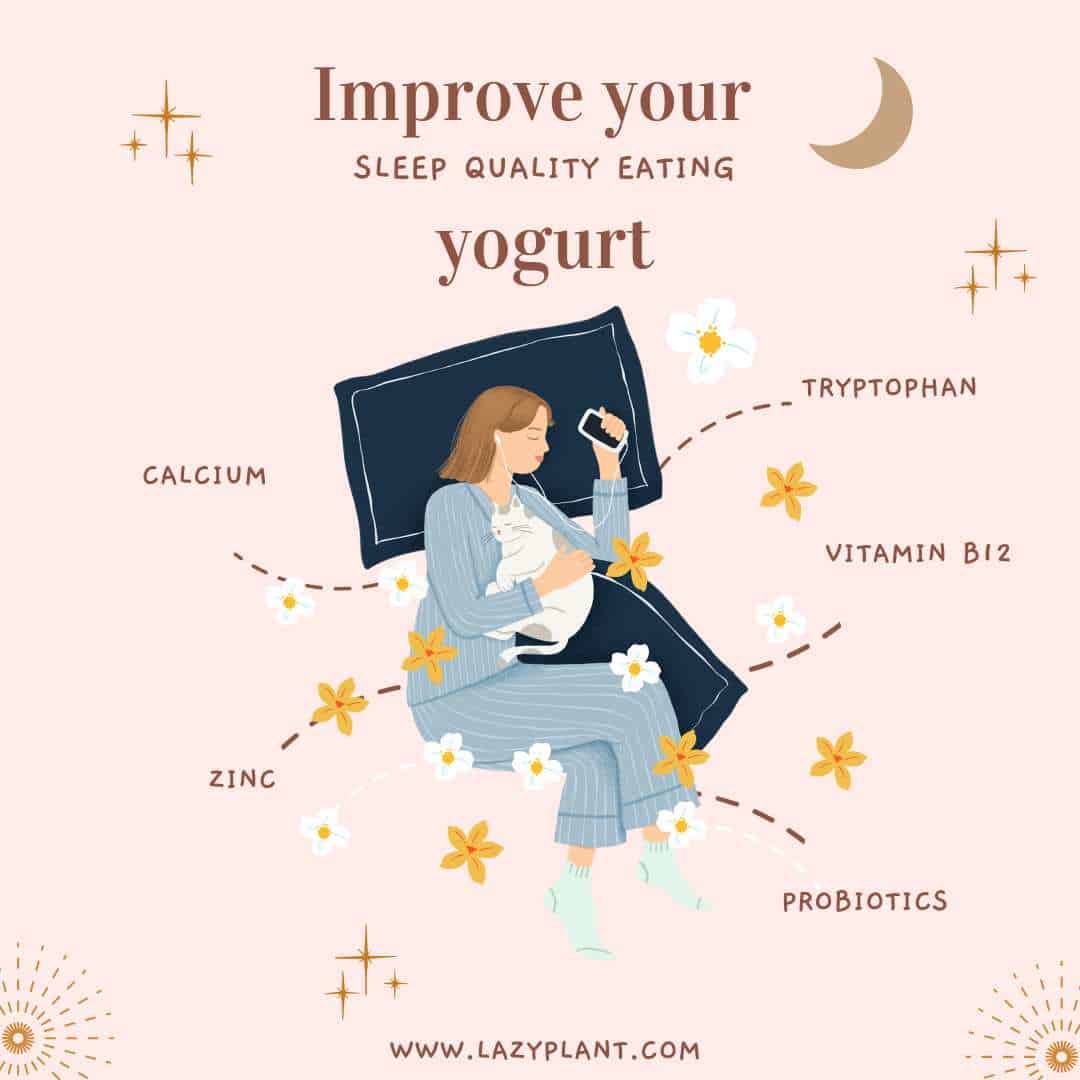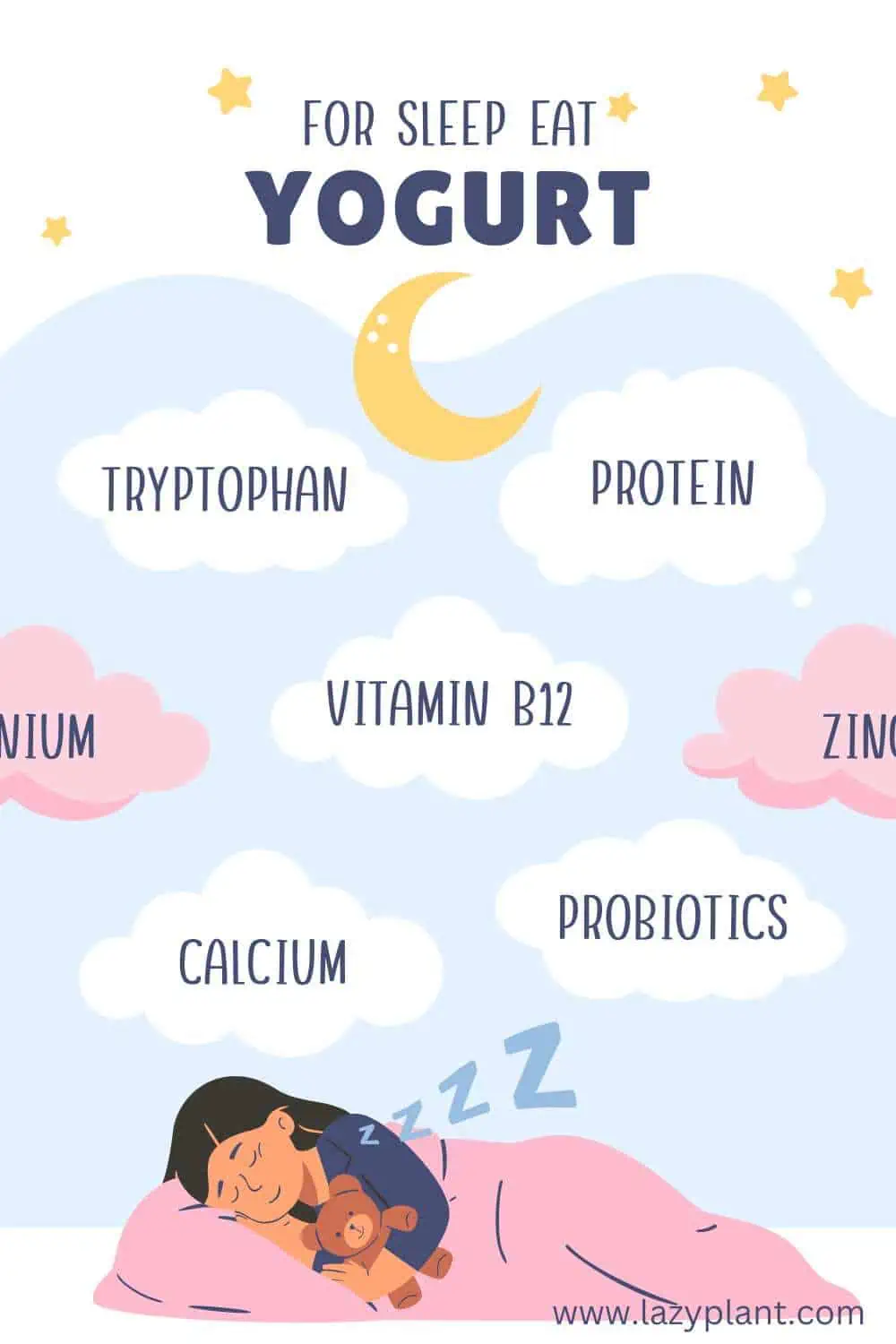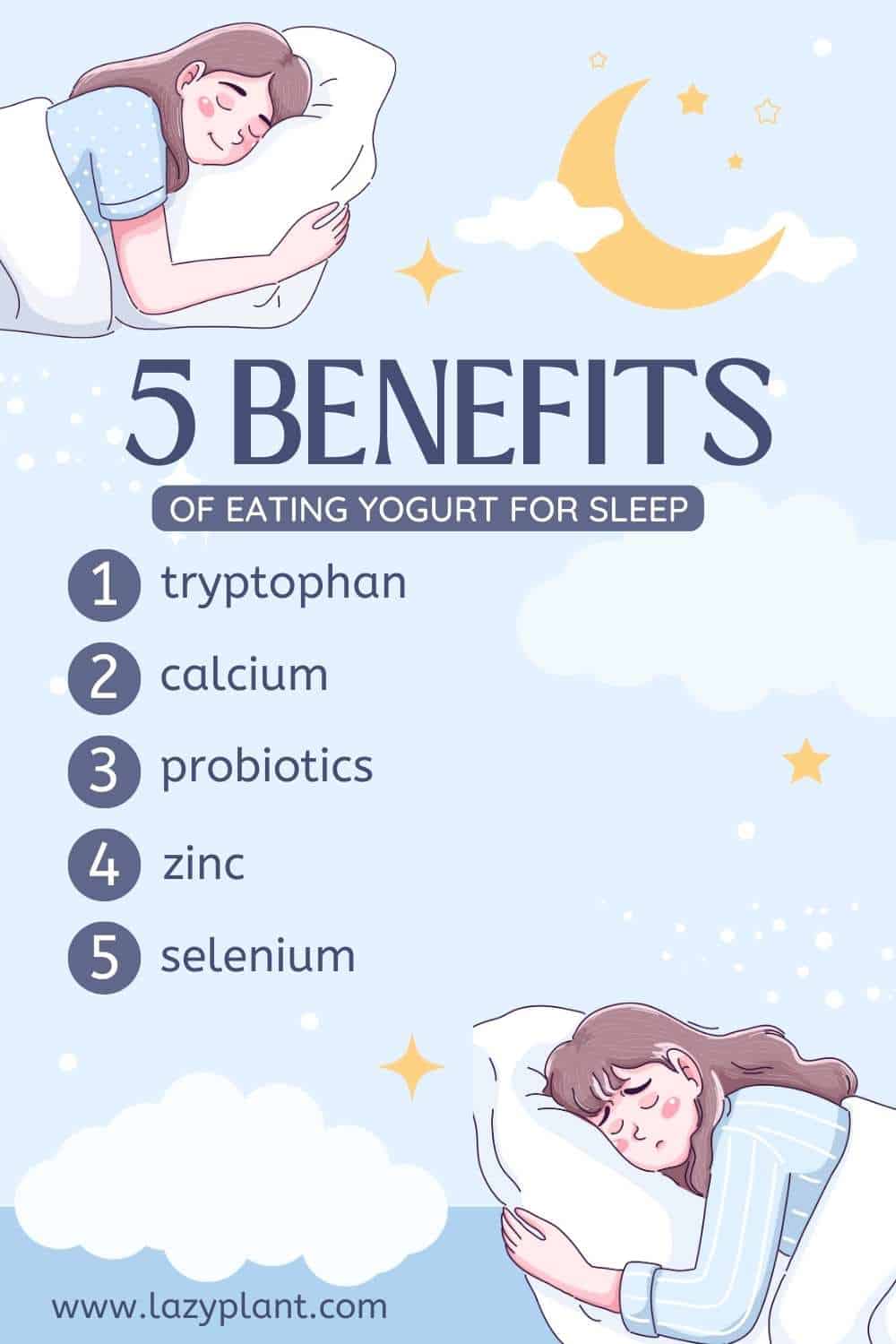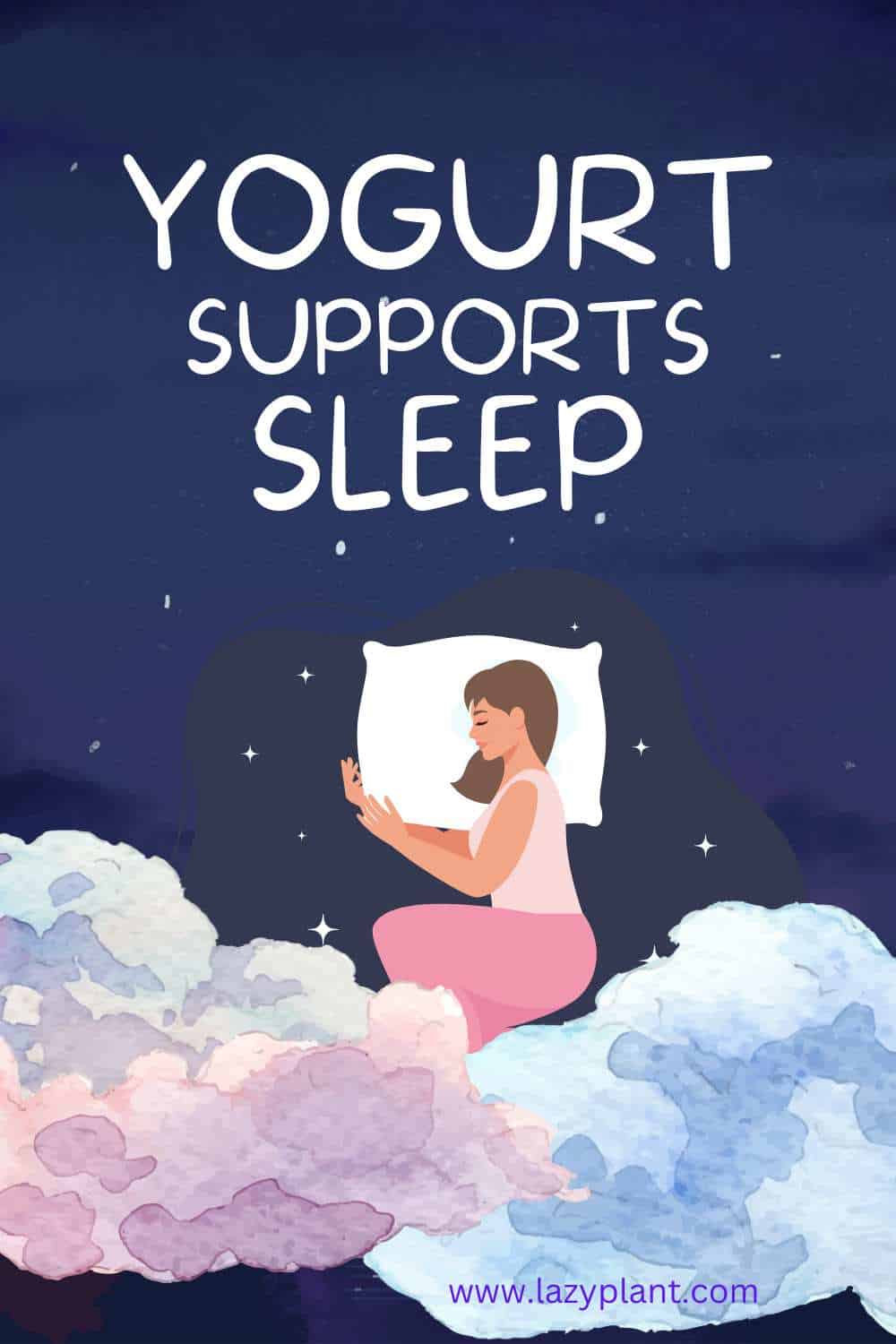Eating a cup of yogurt before bed supports a good night’s sleep because it’s packed with compounds that stimulate sleep hormones, such as tryptophan, vitamin B12, probiotics, calcium, phosphorus, zinc, and selenium.
However, you can add certain foods to your yogurt to get necessary compounds for sleep that yogurt lacks, such as vitamin C, vitamin E, melatonin, magnesium, omega-3s, fiber, and many more!
Does eating a cup of yogurt before bed improve sleep?
According to many studies, consuming yogurt or other dairy products before bed as part of a well-balanced diet is effective in improving sleep quality.[1]
Yogurt and other dairy products are notably rich in a range of nutrients that contribute to sleep-promoting effects.[2]
Protein
Firstly, yogurt is high in protein. Nonfat Greek yogurt provides up to 10.3 grams of protein per 100g, or 16 grams per serving.[3]
Diets high in protein have been associated with better sleep quality.[4]
In fact, eating yogurt for dinner helps sleep better at night because it’s particularly rich in tryptophan. It has about 133 mg of tryptophan per 100g, or 207 mg per serving. This is about 50% of the recommended daily intake!

Other common foods high in tryptophan are chicken, turkey, red meat, pork, fish, eggs, and other dairy products.
Tryptophan is an amino acid that serves as a cofactor in the synthesis of melatonin and serotonin.
Melatonin is known as the sleep hormone. Among others, it regulates sleep onset latency. Hence, we should eat foods with melatonin at night for better sleep.
Serotonin plays a key role in sleep and mood as well.
Calcium
Furthermore, yogurt aids in a good night’s sleep because it’s one of the richest foods in calcium. It has about 110 mg of calcium per 100g, or 170 mg of calcium per serving. This is 17% of the Daily Value!
Getting adequate amounts of calcium is important for rejuvenating sleep. Calcium regulates sleep and activity rhythm.[5]
Vitamin B12
In addition, yogurt, milk, and other dairy products are the main dietary sources of vitamin B12 for many people. A cup of yogurt provides approximately 45% of the Daily Value. Most noteworthy, vitamin B12 in yogurt is highly bioavailable.
Eggs, poultry, red meat. and fish are other good dietary sources of vitamin B12. On the contrary, vegan foods have no vitamin B12.
Vitamin B12 deficiency has been associated with poor sleep.[6]
As vitamin B12 deficiency is common worldwide, most people would benefit from taking 1,000 mcg of vitamin B12 from supplements once a week.
Vitamin D
Vitamin D deficiency is also very common worldwide, as there aren’t many foods with vitamin D.
It has been closely associated with daytime sleepiness and shorter sleep time. Getting adequate amounts of vitamin D could improve insomnia symptoms.[7]
Yogurt and other dairy products are naturally low in vitamin D. You could consume fortified products, though. In fact, fortified yogurts contain decent amounts of vitamin D.
Keep in mind that vitamin D and vitamin B12 deficiencies are pretty common! The easiest way to maintain healthy levels of vitamin B12 and D is by taking supplements. You can find a wide variety of supplements at the best prices on iHerb.
Probiotics
Furthermore, many yogurts are packed with probiotics. These organisms are beneficial for gut microbiota and overall health.
For instance, they fight inflammation and may have beneficial effects on Inflammatory bowel disease (IBD).[8,9]
Also, yogurt with probiotics may improve lactose digestion and eliminate symptoms of lactose intolerance.[10]
According to many studies, probiotics appear to improve sleep quality and mood, while reducing stress.[11]
Phosphorus
Moreover, yogurt is an excellent dietary source of phosphorus. It has about 210 mg of phosphorus per serving. This is 30% of the Daily Value!
Phosphorous appears to affect sleep duration, sleep quality, and daytime sleepiness.[12]
Zinc
Another reason why we should eat Greek yogurt at dinner is because it’s high in zinc. A cup provides 0.83 mg of zinc. This dose is almost 8% of the recommended daily intake.
Having normal zinc concentrations is necessary for increased sleep duration and better sleep quality.
Selenium
Another essential mineral that has been associated with optimal sleep duration is selenium. Especially among overweight individuals.
A serving of Greek yogurt provides about 15 mcg of selenium, which is 28% of the Daily Value.
Not all types of yogurt support a good night’s sleep!
The best yogurt for a good night’s sleep is plain, unsweetened Greek yogurt. It’s the best option for dinner because it’s naturally high in protein and especially tryptophan. Also, it’s packed with compounds that stimulate the synthesis of melatonin, serotonin and other sleep hormones.
On the contrary, you should avoid yogurts with added sugar. Flavored yogurts, yogurt desserts, or sweets with yogurts are typically packed with added sugar.

Also, you should avoid adding sugar-rich toppings on your yogurt. Even dried fruits like raisins and dates are packed with sugar. You should avoid adding them to your late-night snacks.
The best time to eat foods high in sugar is after strenuous exercise. Then, sugar promotes muscle recovery.
Consuming too much sugar before bed has detrimental effects on sleep quality! Sugar can cause poor sleep quality and decreased sleep duration.[13]
Moreover, insomnia causes poor glycemic control, leading to a vicious circle.
Fat free, low-fat or full-fat yogurt?
As a rule of thumb, it’s preferred to eat low-fat, unsweetened Greek yogurt before bed for better sleep.
Full fat yogurts are high in saturated fat. A serving of full fat yogurt contains about 3.7 grams of saturated fat. This is almost 30% of the maximum safe intake!
According to the American Heart Association, we should avoid consuming more than 13 grams of saturated fat per day. Too much saturated fat may raise LDL cholesterol and increase the rick of heart disease.[14]
Also, diets high in saturated fat and sugar have been associated with lighter, less restorative sleep with more arousals.[15]
Animal-derived foods are the main dietary sources of saturated fat.
Additionally, you could consume nonfat yogurt at night. However, it shouldn’t contain added sugar. You should eat yogurts which contains 4 grams of sugar per 100g or less.
How long before bedtime should I eat yogurt?
Although eating yogurt at night supports a good night’s sleep, we shouldn’t eat it right before bed. We should have dinner at least a couple of hours before bedtime.
Otherwise, having dinner right before bed can negatively affect sleep quality. It may impair the synthesis of sleep hormones like melatonin. Also, you may feel stomach discomfort.
Most noteworthy, having dinner right before bed substantially increases the risk of gaining weight.
When does yogurt have detrimental effects on sleep?
Can eating yogurt at dinner keep you awake at night? Although highly unlikely, it’s possible!
Lactose intolerant people shouldn’t eat yogurt at dinner
Lactose intolerance may have a negative influence on sleep patterns. Eating yogurt or other dairy products at night may cause abdominal distention, flatulence, or diarrhea to lactose intolerant individuals.[16]
In this case, you should eat lactose free or vegan yogurts.

Yogurt at dinner may be bad for people with digestion issues
People with digestion issues like gastroesophageal reflux disease (GERD) may have to avoid consuming yogurt before bed. Especially full-fat yogurt. It may deteriorate symptoms.
Patients better avoid consuming yogurt at night
Patients with allergic diseases, asthma, the flu, or the common cold may have to avoid consuming yogurt or any other dairy product at dinner as well. These products may affect breathing and cause coughing at night, greatly affecting sleep quality.
Always consult your physician before changing your diet.
Cow’s or vegan yogurt for better sleep?
In general, vegan yogurts aren’t as beneficial for a good night’s sleep as a low-fat, Greek yogurt.
They lack of many compounds that stimulate the synthesis of melatonin. For instance, they’re low in tryptophan, vitamin B12, vitamin D, and selenium. Also, in some cases, they’re packed with added sugar.
On the other hand, vegan yogurts are low in saturated fat and have some fiber.
How to eat yogurt at night for better sleep?
There are many ways to enjoy your favorite snack before bed. Just avoid adding toppings packed with sugar, fat, and calories.
Above all, you could add half a handful of seeds or nuts to your yogurt. Prefer mixing many seeds and nuts in order to get a wide variety of vitamins, minerals, and antioxidants.
Adding a handful of whole fruits has many benefits for sleep as well.
Vitamin E
For instance, almonds are particularly rich in vitamin E and magnesium, which have a protective effect on sleep quality and may treat insomnia naturally. Yogurt is a poor source in these compounds!
Omega-3s
Moreover, you should prepare a dinner with yogurt and foods high in omega-3s like walnuts! Also, certain seeds can skyrocket your daily intake of omega-3s.
Avocado is another favorite food containing omega-3s.
Omega-3s are associated with healthy sleep duration. They may improve certain aspects of sleep health.[17]
Vitamin C & antioxidants
Additionally, you could prepare your dinner with yogurt and whole fruits. Fruits are nutrient-dense foods. They’re packed with antioxidants and vitamins.
For instance, vitamin C in fruits has beneficial effects on sleep. Vitamin C may increase sleep duration, reduce sleep disturbances, relieve movement disorders, and decrease the dangerous effects of sleep apnea.
You should eat yogurt with berries in particular. Along with peanut butter and grapes, berries are the richest foods in resveratrol. This powerful antioxidant has anti-inflammatory and neuroprotective properties and may be a potent regulator of sleep-wake rhythms!
Melatonin
Above all, you should eat yogurt with foods with melatonin before bed. Thus, you should eat yogurt with strawberries, cranberries, cherries, and almonds at dinner.
Selenium
Moreover, you could eat Brazil nuts to boost your daily selenium intake. Just a Brazil nut provides more selenium than the recommended daily intake.
Fiber
Last, but not least, nuts, and fruits are among the richest foods in fiber. Diets high in fiber have been associated with better sleep quality.
13 easy to make yogurt recipes for a good night’s sleep!
Preparing a dinner with yogurt, fruits, seeds, and nuts that promotes a good night’s sleep is easy. There are countless recipes for every taste.
- Yogurt with fresh strawberries, banana slices, and a drizzle of honey.
- Greek yogurt with blueberries and chopped almonds.
- Yogurt parfait with layers of granola, mixed berries, and a tablespoon of jam on top.
- Yogurt with half banana, a handful of raw blueberries, and soaked chia seeds.
- Yogurt bowl with sliced kiwi, chopped walnuts, and a sprinkle of cinnamon.
- Yogurt with mixed berries, flaxseeds, and a drizzle of honey.
- Yogurt bowl with sliced banana, hemp seeds, and a tablespoon of almond butter.
- Greek yogurt with fresh cranberries, raspberries, and chopped Brazil nuts.
- Yogurt bowl with sliced strawberries, chopped almonds, and a tablespoon of your favorite berry jam.
- Yogurt with raw blueberries, chopped roasted almonds, and a tablespoon of honey.
- Yogurt with a sliced kiwi, hemp seeds, and a drizzle of berry jam.
- Greek yogurt with fresh blueberries, raspberries, a sprinkle of cinnamon, and some honey.
- Yogurt with granola, sliced strawberries, and a tablespoon of jam.
It’s important to consume sweeteners that contain no added sugar.
Blueberry jam or any other high-quality berry jam with no added sugar are the best option for adding flavor to your yogurt. Berries are low in sugar, while they’re among the richest foods in antioxidants.
Also, you could add some cinnamon to your late-night yogurt. Cinnamon controls glycemic responses. Moreover, cinnamon may increase serotonin and melatonin levels.[18]
Can eating yogurt during the day make me sleepy?
In general, eating yogurt during the day should not make you sleepy. It isn’t a known sleep-inducing food.
But, it’s possible to feel fatigue after consuming yogurt if it’s eaten after a calorie-dense meal. Overeating can make you feel lethargic. Timing of eating plays a key role in energy levels.
Also, consumed quantity may affect your energy levels. Too much yogurt with hard to digest toppings can make you sleepy during the day.

Yogurt, milk, or other dairy before bed for better sleep?
In fact, yogurt is a safer option for those who are lactose intolerant or have sensitivities to cow’s milk. As a rule of thumb, fermented foods are healthier. Yogurts with probiotics improve gut microbiota.
We better consume yogurt rather than milk at dinner for improved sleep.
What’s the best time of the day to eat yogurt?
Actually, we can consume yogurt at any time during the day. If you want to lose weight, you can enjoy it at breakfast, at dinner, or as a filling snack between meals. Also, eating yogurt after a workout promotes muscle growth.
But, if you want to improve sleep quality, the best time to eat yogurt is in the evening or at dinner.
Other great late-night snacks for a good night’s sleep!
There are many nutrient-dense foods you can eat at night for a better sleep and weight loss.
For instance, turkey, chicken, and tuna sandwiches are great late-night snacks for a good night’s sleep. Fruit salad and peanut butter and jelly sandwich have beneficial effects on sleep as well.
Foods to avoid eating at night
You should avoid consuming foods with sugar and fats at dinner. Fried foods and sweets may negatively affect sleep quality and sleep onset latency.
Also, you should have light dinner. Too many calories before bed can disrupt your natural sleep cycle.
Spicy foods, caffeine, and alcohol are bad for sleep as well.